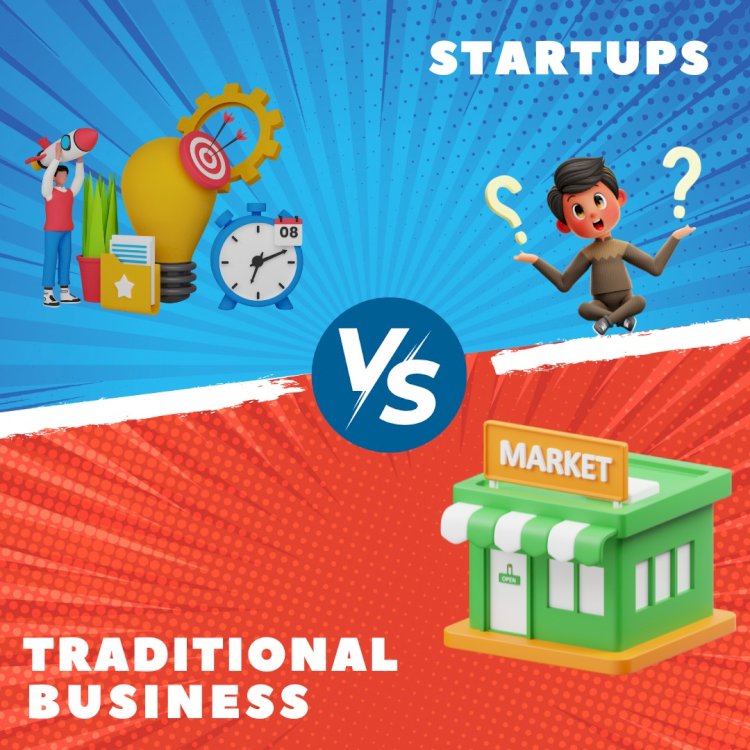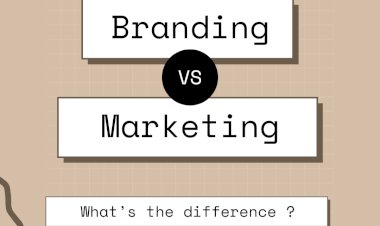Startup or Traditional Business: Which Model Fits Your Entrepreneurial Vision?
Discover the key differences between startups and traditional businesses, including growth potential, risk factors, funding sources, and work culture. Learn which model suits your entrepreneurial goals best.

Introduction: Understanding Business
Business is the foundation of economic activity, involving the production, distribution, and sale of goods or services to generate profit. It can range from small, family-run enterprises to large multinational corporations. While some businesses follow traditional models focused on stability and long-term growth, others, such as startups, prioritize innovation and rapid scaling. Understanding the difference between these approaches is crucial for aspiring entrepreneurs who want to make informed decisions.
Startup:
A startup is a newly established business designed for rapid growth, often driven by innovation, technology, and scalability. It operates in uncertain markets, takes high risks, and seeks disruptive solutions to existing problems.
Orthodox Business:
An orthodox business follows a traditional and stable model, focusing on proven strategies, steady growth, and profitability. It operates with lower risk, prioritizes sustainability, and often serves local or regional markets.
Understanding the difference between a startup and an orthodox business is crucial for aspiring entrepreneurs, as it helps them align their business goals, risk appetite, and growth strategy. Startups demand innovation, high risk, and rapid scaling, while traditional businesses offer stability, predictable growth, and long-term sustainability. Choosing the right model ensures better resource allocation, funding strategy, and long-term success in a competitive market.
Key Differences between Startups and Orthodox Businesses
- Growth Potential: Startups focus on rapid scaling, while orthodox businesses grow steadily over time.
- Risk & Stability: Startups operate in high-risk, high-reward environments, whereas orthodox businesses offer stability and lower risk.
- Innovation & Disruption: Startups prioritize innovation and industry disruption, while orthodox businesses follow proven models.
- Funding Sources: Startups rely on venture capital, angel investors, or crowdfunding, while orthodox businesses are typically funded through personal savings, loans, or revenue.
- Profitability Focus: Startups prioritize market expansion over immediate profits, whereas orthodox businesses focus on profitability from the start.
- Work Culture: Startups have a flexible, fast-paced environment, while orthodox businesses follow structured operations.
- Exit Strategy: Startups often aim for acquisition or IPO, while orthodox businesses focus on long-term sustainability and steady income.
Real-Life Examples
- Startup Examples:
- Uber: Disrupted the traditional taxi industry with a digital ride-hailing platform.
- Zomato: Transformed food delivery and restaurant discovery through technology.
- Paytm: Revolutionized digital payments and financial services in India.
- Orthodox Business Examples:
- Local Grocery Store: Operates with a steady customer base and a traditional retail model.
- Family-Owned Restaurant: Focuses on consistent service and long-term sustainability.
- Manufacturing Business: Produces goods using established industry practices and steady supply chains.
Pros and Cons of Each Model
- Startup Model:
- Pros:
- High potential for rapid growth and innovation.
- Opportunity to disrupt industries and create new markets.
- Attracts venture capital and investors.
- Cons:
- High risk of failure and uncertainty.
- Requires significant upfront investment and resources.
- Can be unstable in the early stages.
- Orthodox Business Model:
- Pros:
- Steady growth with predictable income.
- Lower risk and more stability.
- Easier to manage and maintain over the long term.
- Cons:
- Slower growth compared to startups.
- Less opportunity for disruptive innovation.
- Limited scalability in some industries.
Which One Should You Choose?
- Choose a Startup if you:
- Are comfortable with high risk and uncertainty.
- Want to innovate, disrupt industries, and create something new.
- Have a strong passion for growth and scalability, and are open to external funding.
- Seek fast, high-reward opportunities with the potential for significant returns.
- Choose an Orthodox Business if you:
- Prefer stability and a more predictable path to success.
- Are focused on long-term sustainability and steady profitability.
- Want to work with established models that don’t require high innovation or risk.
- Aim to build a business that can be passed down or operated for many years.
Conclusion
Ultimately, the choice between a startup and an orthodox business depends on your personal goals, risk appetite, and business vision. Startups offer rapid growth and innovation, making them ideal for entrepreneurs eager to disrupt industries and embrace uncertainty. On the other hand, orthodox businesses provide stability and steady returns, appealing to those who prioritize long-term sustainability and proven models. By understanding these key differences, aspiring entrepreneurs can make informed decisions that align with their aspirations, resources, and market conditions.

 rovin.v@incubationmasters.com
rovin.v@incubationmasters.com 






















